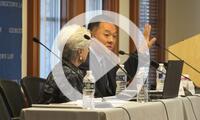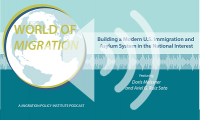
Doris Meissner
Senior Fellow and Director, U.S. Immigration Policy Program
Doris Meissner, former Commissioner of the U.S. Immigration and Naturalization Service (INS), is a Senior Fellow at MPI, where she directs the Institute’s U.S. immigration policy work.
Her responsibilities focus in particular on the role of immigration in America’s future and on administering the nation’s immigration laws, systems, and government agencies. Her work and expertise also include immigration and politics, immigration enforcement, border control, cooperation with other countries, and immigration and national security. She has authored and coauthored numerous reports, articles, and op-eds and is frequently quoted in the media. She served as Director of MPI's Independent Task Force on Immigration and America's Future, a bipartisan group of distinguished leaders. The group's report and recommendations address how to harness the advantages of immigration for a 21st century economy and society.
|
Media Requests |
From 1993-2000, she served in the Clinton administration as Commissioner of the INS, then a bureau in the U.S. Department of Justice. Her accomplishments included reforming the nation's asylum system; creating new strategies for managing U.S. borders; improving naturalization and other services for immigrants; shaping new responses to migration and humanitarian emergencies; strengthening cooperation and joint initiatives with Mexico, Canada, and other countries; and managing growth that doubled the agency’s personnel and tripled its budget.
She first joined the Justice Department in 1973 as a White House Fellow and Special Assistant to the Attorney General. She served in various senior policy posts until 1981, when she became Acting Commissioner of the INS and then Executive Associate Commissioner, the third-ranking post in the agency. In 1986, she joined the Carnegie Endowment for International Peace as a Senior Associate. Ms. Meissner created the Endowment's Immigration Policy Project, which evolved into the Migration Policy Institute in 2001.
Ms. Meissner is Vice Chair of the board of trustees of the Wisconsin Alumni Research Foundation. She is a member of the Council on Foreign Relations, the Inter-American Dialogue, the Pacific Council on International Diplomacy, the National Academy of Public Administration, the Administrative Conference of the United States, and the Constitution Society.
Bio Page Tabs
The 20th annual Immigration Law and Policy Conference, organized by MPI, Catholic Legal Immigration Network, Inc., and Georgetown University Law Center, features fresh, thoughtful policy and legal analysis, and discussion of some of the top immigration issues by leading government officials, attorneys, researchers, advocates, and other experts.
As the U.S. immigration court system struggles with record case backlogs, decisions take years, immigration enforcement is delayed, and wait times incentivize unauthorized arrivals. This discussion examines the factors that have driven the system to the point of crisis and possible fixes.
Focusing on top immigration policy issues at federal and state levels, this 2022 Immigration Law and Policy Conference featured keynotes by Connecticut Attorney General William Tong and Arkansas Governor Asa Hutchinson exploring the growing role states are taking in the national immigration debate.
This MPI discussion with leading experts, advocates, and a top official from the administration examines the Biden track record on immigration and what lays ahead
People on all sides of the policy debate largely agree that the U.S. immigration system is broken. What should a 21st century system that works in the national interest look like? And is this vision achievable amid current political realities?
Pages
Recent Activity
Focusing on top immigration policy issues at federal and state levels, this 2022 Immigration Law and Policy Conference featured keynotes by Connecticut Attorney General William Tong and Arkansas Governor Asa Hutchinson exploring the growing role states are taking in the national immigration debate. Multimedia of the day's panel discussions will be posted later.














The U.S.-Mexico Border Problem Will Not Be “Solved” Until All Parts of the Border Enforcement System Are Properly Resourced
A Post-Title 42 Vision for Migration Management Comes into Focus
Revamping Asylum at the U.S.-Mexico Border: A Workable Rescue?
Straight Path to Legal Permanent Residence for Afghan Evacuees Would Build on Strong U.S. Precedent
Biden Administration Asylum Processing Revamp at the U.S. Border Could Be a Game Changer
Biden Administration Is Making Quick Progress on Asylum, but a Long, Complicated Road Lies Ahead
USCIS Budget Implosion Owes to Far More than the Pandemic
USCIS Fee Increase Proposed Rule Could Represent the Latest Step in Reshaping Immigration to United States
Policy Solutions to Address Crisis at Border Exist, But Require Will and Staying Power to Execute
A Wall Cannot Fix Problems at Border; Smart Solutions for Asylum Crisis Can
Asylum Reform, Not Troops, Is the Solution to Current Border Reality
Crisis at the Border? Not by the Numbers
Juan Osuna: A Tribute to an Indispensable Person
Taking Action to Reflect Current Reality: Obama Administration Ends “Wet Foot, Dry Foot” Policies on Cuban Migration
The Current Record on Deportations: What Underlies the 'Eye of the Beholder' Dynamic?